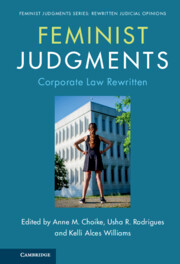Book contents
- Feminist Judgments: Corporate Law Rewritten
- Feminist Judgments Series Editors
- Advisory Panel for Feminist Judgments Series
- Feminist Judgments: Corporate Law Rewritten
- Copyright page
- Dedication
- Contents
- Advisory Panel for Feminist Judgments: Corporate Law Rewritten
- Notes on Contributors
- Acknowledgments
- About the Cover Art
- Table of Cases
- Part I Introduction and Overview
- Part II Legal Personality, Identity, and Limited Liability of Corporate Entities
- Part III Role and Purpose of the Corporation and Corporate Combinations in Society
- Part IV Fiduciary Duties in Corporate Governance
- 8 Commentary on Meinhard v. Salmon
- 9 Commentary on Smith v. Van Gorkom
- 10 Commentary on White v. Panic
- 11 Commentary on Francis v. United Jersey Bank
- 12 Commentary on In re The Walt Disney Co. Derivative Litigation
- Part V Closely Held Businesses and Other Considerations Regarding the Composition of Boards, Management, and Owners
- Part VI Protecting Investors and Potential Investors in Corporations
- Part VII From Foundations to Future Directions
- Index
8 - Commentary on Meinhard v. Salmon
from Part IV - Fiduciary Duties in Corporate Governance
Published online by Cambridge University Press: 15 January 2023
- Feminist Judgments: Corporate Law Rewritten
- Feminist Judgments Series Editors
- Advisory Panel for Feminist Judgments Series
- Feminist Judgments: Corporate Law Rewritten
- Copyright page
- Dedication
- Contents
- Advisory Panel for Feminist Judgments: Corporate Law Rewritten
- Notes on Contributors
- Acknowledgments
- About the Cover Art
- Table of Cases
- Part I Introduction and Overview
- Part II Legal Personality, Identity, and Limited Liability of Corporate Entities
- Part III Role and Purpose of the Corporation and Corporate Combinations in Society
- Part IV Fiduciary Duties in Corporate Governance
- 8 Commentary on Meinhard v. Salmon
- 9 Commentary on Smith v. Van Gorkom
- 10 Commentary on White v. Panic
- 11 Commentary on Francis v. United Jersey Bank
- 12 Commentary on In re The Walt Disney Co. Derivative Litigation
- Part V Closely Held Businesses and Other Considerations Regarding the Composition of Boards, Management, and Owners
- Part VI Protecting Investors and Potential Investors in Corporations
- Part VII From Foundations to Future Directions
- Index
Summary
Meinhard v. Salmon found a heightened duty of loyalty among joint adventurers: the duty of finest loyalty. Famously, Chief Judge (and later, Associate Justice of the United States Supreme Court) Cardozo wrote that trustees are held to “not honesty alone, but the punctilio of an honor the most sensitive.” Professor Christine Hurt comments on the missing history surrounding the relationship of Meinhard and Salmon and the condition of the United States at the time the underlying transactions took place. Professor Dalia Mitchell, rewriting the Meinhard opinion as Justice Mitchell, reaches the same conclusion but through vulnerability theory and the feminist widening the lens method. In doing so, she considered the history, context, and persons affected by the outcome in a way unique to the rewritten opinion. The original opinion is critiqued for essentially providing the utmost care or no duty whatsoever with nothing in between. Notably, the initial decision only takes the contractual relationship between Meinhard and Salmon into account. Under vulnerability theory, the opinion should consider the overall context of joint adventurers’ relationships to reach more equitable decisions.
Keywords
- Type
- Chapter
- Information
- Feminist Judgments: Corporate Law Rewritten , pp. 191 - 220Publisher: Cambridge University PressPrint publication year: 2023

